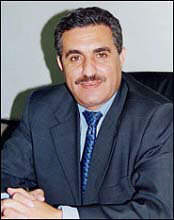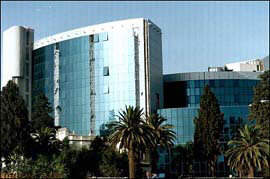 FINANCE FINANCE |
 Dynamic Banks Dynamic Banks |
Apart from the Central bank, the Algerian Banking system accounts some 20 commercial banks, three major international bank branch offices, a stock exchange, a mortgage refinancing company and a credit insurance company…etc.. This would not have been possible without the deep reform of the financial system conducted in order to sustain the overall Governmental reforms . However, in spite of the private emergence in the sector, the public banking sector still has the grip on the market. One should raise the significant participation of the banks in the financing of the economic activities. " The banking sector is involved in important changes which should appear by a more important banking facilities extension and faster operations. This modernization should also be boosted by international partnerships. The economic stimulation and privatization plan offers other opportunities mainly within financial engineering , major projects financing packages and the development of leasing type financing or risk capital" , says Mr. El Hachemi Meghaoui, General Manager of CPA (Credit Populaire Algerien) the Algerian Popular Credit.

 Opening of the capital up to 100% Opening of the capital up to 100% |
It has come possible now to reach a considerable service quality after a long restructuring process of the public banks treasury which is at its final step. These are getting to a more balanced situation necessary to stand against the hard competition launched by the private banks. Indeed, with the new legislation regarding privatization and the public sector management , public banks are able now to open their capital up to 100% and even reach a total privatization. This is the case of the Algerian Popular Credit (CPA) which, according to its General Manager Mr. El Hachemi Meghaoui, has already taken the decision to open its capital: " We have made a major step as for the opening of our bank capital since 1999. Thus, we decided according to the guidelines and agreement of our shareholders to open our capital. This has been considered as necessary in order to achieve our ambitions and become then open to the world markets; offering to our clients a variety of services available worldwide". A progress has been noticed in this by the creation of new services within the CPA such as the credit on real property, consumer credit and that for liberal profession. As for the computer network of all the CPA agencies , it has been widely upgraded and is being subject to a project concerning the implementation of an inter-bank parcel service. Moreover, the CPA actively participate in the program of the payment system upgrading by the introduction of the credit card.
The same ambitions are noticed at the Banque de l'Agriculture et du Developpement Rural (BADR) Bank of Agriculture and Rural Development. This was first destined to meet the specific needs of the agricultural and rural sector. However, with the new economic policy , the bank extended its activities to others sectors and adapts according to the new market requirements. The bank recently established the concept of "assize bank" with personal services allowing to better serve businessmen and projects holders.
Further to this initiative, many important companies joined the BADR like Naftal, Sonelgaz, Sonatrach, and Orascom. As for the opening of the capital to a foreign partner, Mr Farouk Bouyacoub, General Manager of the BADR says that: " The priority is now to upgrade the bank in order to be in a position of force while negotiating the entrance of a foreign partner in our capital" .
As for the other sectors of the Algerian economy, the sector of the banks has noticed a revival of the private activity. Up to now and since the liberalization of the banking sector in 19991, we have six (06) Algerian private banks among which the most famous El Khalifa Bank which extended its agencies all over the Algerian territory. Khalifa Bank is the only one that is considered universal and has developed personalized services like Fidelity card or electronic payment. According to Mr Rachid Amrouche Secretary General of Khalifa Group " Since its creation, the bank has showed a strategy aiming at better serving its clients in terms of reception, operations deadlines and the offer of new services. In fact, we have counters the services of which are more modern than those provided by the competition. We succeeded in providing the economic operators a wide range of banking services intended for modern consumers. Thereby, we invested both in the new technologies and in the human resources as well in order to better serve our clients". As for the foreign banks, twenty branch offices have been created these past few years such as The City Bank, Société Générale, BNP Paribas and Exim Bank. The settlement of these Banks would surely bring a new breath to the Algerian financial sector by stimulating the market.
 Turbulent Banking Turbulent Banking |
Considering the process of the country market opening , the Algerian population is getting more and more demanding regarding their banking system; needless to talk about the national and foreign investors who essentially need an efficient financial support in the framework of their purchasing operations, partnerships and of course that of privatization. In this respect, economists seriously apprehend to see privatized companies , same as newly implemented investments, left to a financial sector out of steam and unable to support them. Therefore, the efficiency and the credibility of the banking services are thus among the criteria to be taken into consideration in the process of the Algerian banking system reform. This latter is less visible in the public banks. Indeed, the debts accumulation seriously slowed down the upgrading process ; whereas the service quality, constraints on credits ( 35 to 45 days for a credit letter) and the slowness of the procedures are real barriers for the country economy. In fact, it is prejudicial that money transfers between two agencies take one to two months; fund transactions passing through the Central Bank take one to two months; an other example to illustrate this slow procedures is that checks are still not accepted in buying or transactions. For all this ,we notice a weak rate of banking services extension; meanwhile the public banks bureaucracy keeps on repelling lots of customers who still do not trust these banks.
|  Insurance: Instill the Notion of Risk Insurance: Instill the Notion of Risk |
Since 1995, ten private insurance companies came to existence without counting their authorized agencies. In fact, the economic boost stimulated the revival of the activity within this sector. This revival motivated many private banks and led them to create their own insurance branch with the perspective to multiply by four their turnover by the year 2005.

According to a recent survey conducted by the National Council Of Insurance ( CNA), the market is valued at 250 million US$/ year which is considered, by the experts of the sector, as unimportant compared to the real potential of the said market. According to the same experts, it is essential to ease the laws allowing a larger liberalization and thus launch the privatization process of the public companies such as the SAA, CAAR and the CAAT. Mr Mourad Medelci , former Minister of Finances, thinks that the next step in the financial system reform shall be that concerning the insurance. He also asserts that " The problem of the insurance is related to the local attitude which is not used to the notion of risk eventhough considered as the main thing within a market economy. The notion of risk should be clearly instilled into the economic operators and people 's minds. It is thus essential to progressively introduced a new culture and attitudes so that the economic operators and the common people feel the need to take out an insurance policy against any type of risk, whether social or economic".
The Algerian insurance sector offers lots of investment opportunities. This is confirmed by the General Manager of la CAAR (Caisse Algerienne d'Assurance et de Reassurance) the Algerian Insurance and Reinsurance Fund who says: "The Algerian insurance market is still virgin and offers plenty of investment opportunities. In terms of figures the market potential is valued at about one billion US$ whereas, at the present time, we only exploit 250 million US$. The difference is huge. It is only with investment that we can boost this sector"
Speaking of investment, the French Company of Foreign Trade Insurance (Coface) believes that " the risk Algeria is now acceptable" i.e. Algeria is safer for investments. This is why the Coface intervenes in Algeria through short-run insurance-credits intended for products of consumption , medium-run insurance credits, investment insurance and building insurance.
 Algiers Stock Exchange: Still in its infancy Algiers Stock Exchange: Still in its infancy |
Some Insurance companies will soon be among the companies to be listed in the Algiers stock exchange. Inaugurated in 1998 , it runs with only four securities (the Sonatrach bonds and the shares of Saidal, Eriad Setif and El Aurassi Hotel) and one quotation session a week.
Considering the shareholders who were many to invest, the financial sector is longing for the market revitalization; in fact, twenty public companies will launch, by this year, their public offers of sale and two major private companies shall imminently announce their listing.
Moreover, other changes are expected in the real property credit. This package of measures set in 1998 envisions to offer the possibility to certain fringes of society the capacity to have a bank credit in order to get a house and to property developers the support to finance their estate projects. Nevertheless, this initiative has not yet met the expected success due to the weak buying power but mainly because of the high interest rate (11%) implemented right at the beginning of this service. For some analysts, it is mainly due to the state rent-sale formula recently launched and granting the beneficiaries credit facilities over 20 years with zero interest. " In terms of rent-sale formula, the first forecast of the government is about 100 000 houses whereas the housing deficit turns around 700 000 to 800 000 houses. Thereby, this rent-sale formula targets a specific population which is not ours. The promotional housing is intended to people having average and regular income. Our product is provided with a better quality" says Mr Mourad Goumiri General Manager of la Société de Garantie du Credit Immobilier (SGCI), Company of Property Credit Warranty. "Our strategy is to be able to ensure the development of this market, create a partnership with all the companies willing to do so and then privatize the company as soon as possible. To do so, we need an international partner having the know how in the field so that we can take advantage of the new technologies and of his experience". In the meantime, the SGCI has conducted a training session in collaboration with the UNDP. " We will soon sign a contract with the world bank in order to develop the market in terms of procedures training, study and logistic means". This is the reason why the SGCI " intends to implement the necessary plan and measures that would help to sweep away all the barriers encountered in the housing sector, notably the legal framework, the technical, economic and study assessment". Mr Goumri also warns that: " People should not only invest but should do it promptly. In terms of guaranties, we have the necessary foreign currency reserves and our national accounts are quite good , all this make us be an acceptable risk". |

